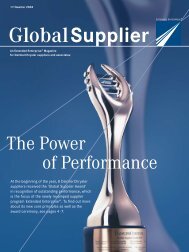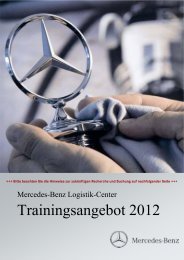GlobalSupplier - Daimler
GlobalSupplier - Daimler
GlobalSupplier - Daimler
Create successful ePaper yourself
Turn your PDF publications into a flip-book with our unique Google optimized e-Paper software.
4<br />
Global Cover Story<br />
Commercial Vehicles Actros Model Refinement<br />
More Than Just a Facelift<br />
About three years ago, the Commercial Vehicle division started a model<br />
refinement project for the Actros to update the truck series originally introduced<br />
in 1996. For the first time, this upgrade project has incorporated<br />
some new steps that have significantly revised the product development<br />
process and, at the same time, have had positive effects on the collaboration<br />
between <strong>Daimler</strong>Chrysler and its supply partners.<br />
At this point, we can let you in on<br />
some of what has already been accomplished:<br />
When the Actros MP II (“MP II”<br />
is the internal designation for the model<br />
refinement project) is finally presented to<br />
the public at next year’s IAA commercial-vehicle<br />
show in Hanover, those<br />
attending will see “an almost entirely<br />
new vehicle,” states Achim Hornung,<br />
head of Procurement Commercial Vehicles,<br />
Exterior, Area Support, referring to the<br />
vehicle’s multifaceted features which are<br />
as new as the implemented development<br />
process itself. “We applied this revamped<br />
process for the first time in the Actros<br />
refinement,” he reminisces. “The goal<br />
of the new approach was<br />
to involve our suppliers even earlier on<br />
in exercising their own responsibilities for<br />
component development.”<br />
A Far More Stringent Process. With the<br />
introduction of skeleton specifications,<br />
concept approvals and functional specifications<br />
during the design phase, the overall<br />
development process was tightened up<br />
considerably. “Sure, having to write a<br />
comprehensive document like a detailed<br />
functional spec can be very time-consuming,”<br />
Hornung concedes, “but in the long<br />
run it pays off in supporting product<br />
development.” As early as during the<br />
concept approval stage potential suppliers<br />
were already involved in contributing<br />
their competing ideas to the process.<br />
These proposals were then evaluated<br />
to determine which ones were most<br />
promising from both technological and<br />
economic standpoints. In addition to<br />
Procurement, above all Development, but<br />
also plant representatives from Logistics,<br />
Quality Assurance as well as from<br />
Production Planning and Cost Planning<br />
were involved in making these selections.<br />
After this phase, while being supported<br />
by <strong>Daimler</strong>Chrysler, the suppliers finally<br />
selected were expected to conduct “their<br />
own largely independent development<br />
work,” Hornung explains, adding that,<br />
“the extent to which we have consistently<br />
employed this approach in this model<br />
refinement project had never been<br />
attempted before.”<br />
Close Interdisciplinary Collaboration.<br />
In this process phase, the PIF (Permanent<br />
Interdisciplinary Function) team organization<br />
once again proved its worth. “It



![Download Global Supplier Magazin [Ausgabe 02/2003] - Daimler](https://img.yumpu.com/20737092/1/190x253/download-global-supplier-magazin-ausgabe-02-2003-daimler.jpg?quality=85)
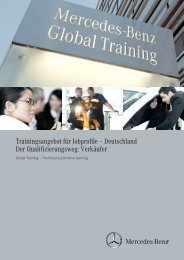
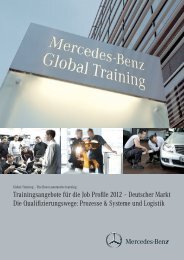
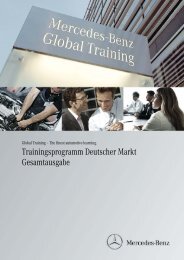
![Download Global Supplier Magazin [Ausgabe 02/2002] - Daimler](https://img.yumpu.com/9325024/1/190x248/download-global-supplier-magazin-ausgabe-02-2002-daimler.jpg?quality=85)
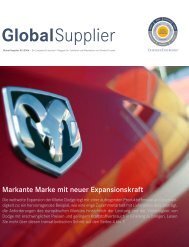
![Download Global Supplier Magazin [Ausgabe 01/2003] - Daimler](https://img.yumpu.com/8073798/1/190x253/download-global-supplier-magazin-ausgabe-01-2003-daimler.jpg?quality=85)
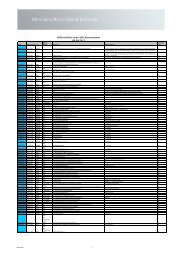

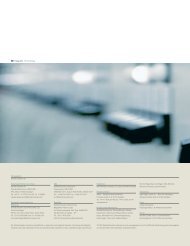
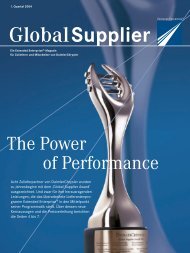
![Download Global Supplier Magazin [Ausgabe 02/2007] - Daimler](https://img.yumpu.com/5703060/1/190x247/download-global-supplier-magazin-ausgabe-02-2007-daimler.jpg?quality=85)
